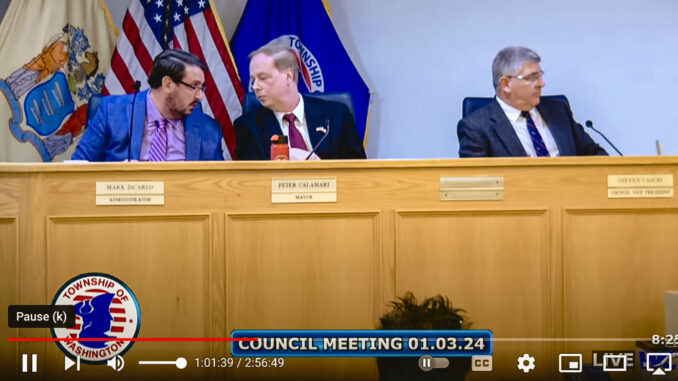
TOWNSHIP OF WASHINGTON—The Township Council is likely to advise employees in specific departments that their jobs will be discussed as officials take on reducing the 2024 municipal budget by 10% where cuts are not otherwise prohibited, the council vice president says.
While budget hearing meeting dates are not yet set to discuss department spending requests, council veep Steven Cascio—who won re-election as an independent as local Republicans elected not to put him on the ballot—said he would like to send out “Rice notices” that inform employees when their jobs or positions might be discussed at a public meeting.
The name comes from a state appeals case, Rice v. Union County Regional High School Board of Education, 1977. Under public information law, a public body in New Jersey—such as a board of education or a municipality which is going to discuss the employment of one or more specific individuals must notify those individuals at least 48 hours in advance of the meeting. This Rice notice must include the time and place of the meeting and that the individual’s employment will be discussed.
It must also inform the individuals affected that they have the right to request that the discussion be held in open session, and how to request this.
Initially, Cascio, who campaigned on a firm budget-cut promise and sits on the council’s 3–2 Independent majority, asked that such notices be sent to all employees who could find themselves affected.
Mayor Peter Calamari has requested to see the majority’s plan to cut the town budget by 10%. He has criticized them for saying they want to reduce so-called discretionary expenses by 10%, despite their campaign promise to reduce the overall budget by that amount.
The majority also includes council president Michael DeSena and member Michael Ullman.
The minority are Republicans Tom Sears and Daisy Velez. Calamari is a Republican as well, and has chided the majority for having backed millions in spending that he advocated only to seek unspecified cuts now.
Town attorney Kenneth Poller said it would make sense to wait until council has a preliminary budget before issuing Rice notices. He said the town employee handbook mandates that personnel discussions be held in private, while a Rice notice permits an employee to have a job discussion in public or in private.
According to administrator Mark DiCarlo, there are approximately 61 town employees.
Sears worried that employees who get a Rice notice might “go numb” and believe that their job might be cut. He said sending out such notices to employees “can be stressful to them.”
Velez said she wanted to understand the plan to “Rice” all or some employees.
Cascio said he wanted to send out the notices to discuss “particular employees or a group of employees” and gather their input if members have questions. “We don’t want to make assumptions of anyone. We want to make sure everyone is heard the way they want to be heard.”
Velez said she had the pleasure of working with employees in several departments as the former public affairs director. She said she “cannot believe we get such quality work for the salaries we’re paying. She said she hoped the new council would keep that in mind “as you’re on your quest for your 10%—that we leave them untouched, is my request.”
DiCarlo asked the town clerk that he be notified of all employees who receive Rice notices prior to the meetings. The clerk agreed.
The conversation on Rice notices occurs at the end of the two-hour Feb. 20 council meeting, which is archived on WCTV-NJ.
Editor’s note: After we reported anew on the proposed budget decimation—historically, to eliminate one out of every 10—in “Fire Dept. budget cuts spark debate; Calamari, DeSena clash on spending,” Michael Olohan, Jan. 16, Mayor Peter Calamari took to Facebook to air his views on the priorities of Council President Michael DeSena and the council majority.
He said in part, “The bottom line is obvious. He and his running mates made promises and guarantees to the voters during the election that they can not and will not keep. Either they knew they could not fulfill those promises when they made them or they are just now learning they won’t be able to.”
He asserted, “Either way, they are scared. They are distancing themselves from their own voting records on spending (the primary factor behind recent tax increases) and they know they will be held accountable and have to answer for unfulfilled promises and guarantees and commitments.”
Your turn: See our Letters guidelines on page 2, and sound off!
